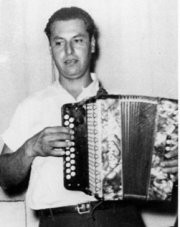
Pedro Ayala
*1911 MX
Latin
Pedro Ayala (1911-1990), “El Monarca del Acordeón,” was born on June 29, 1911, in Ciudad General Terán, Nuevo León, Mexico. He was the son of Emilio Ayala, and he came to Texas when he was eight years old with his family who were field workers. His first instrument was a tambora that his father made for him when he was six years old. His father, brothers, and sister were all musicians, and from them he learned to play a variety of instruments including the guitar, flute, violin and accordion. Around the age of fourteen he began to play the two-row button accordion. Regarding the popularity of the accordion in Tejano music, Pedro said that “Los Alemanes hacen accordiones, los Italianos tocan y los Mexicanos tocan mas bien.” (“Germans build accordions, Italians play them, and Mexicanos play them best.”) Ayala began playing professionally in the 1930s and had a chance to record songs for a scout from an American record company, but he declined the offer because he still felt that he was a novice. He married Esperanza Benítez in 1935. In the 1930s and 1940s he played throughout the Rio Grande Valley with a group whose instruments included the accordion, tambora , guitar, and tololoche . In 1947 he had another opportunity to record. His first recordings were the polkas “La Burrita” and “La Pajarera” on the Mira label, the precursor of Falcon Records. Following his first recordings and throughout the 1950s, he toured Texas and the Southwest playing at dances that would often begin at eight in the evening and continue until six in the morning. Pedro’s favorite musical styles included tangos, boleros, polkas, redovas , and valses. In retrospect he said his favorite music style was the tango, and his favorite tango was “Canto Por No Llorrar” (“I Sing Rather Than Cry”). Pedro Ayala also played with many orchestras such as Eugenio Gutierrez, Beto Villa, and Isidro Lopez. He traveled with his family as a migrant worker in 1959 and worked in farming fields across the northern United States, including Michigan and Ohio, as well as west to California. Ayala continued to perform at dances during this time. He recorded several albums in the 1960s and 1970s including Viva Mi Desgracia (1968) and Adios Mama Carlota (1973). In the 1980s he lived with his wife Esperanza and sons in Donna, Texas. In 1988 the National Endowment for the Arts honored Ayala as a National Heritage Fellow. He died on December 1, 1990. A compilation of his recordings was released on Arhoolie Records in 2001 and titled El Monarca Del Acordeon. He was inducted into the Tejano R.O.O.T.S. Hall of Fame in 2004. Source: The Handbook of Texas Music, Second Ed. (2012); Pg. 101-3.
Genres
Popular Tracks 

Track list and 30sec audio provided by ![]()
Discography
| Title | Artist | Year | Type |
|---|---|---|---|
| El Monarca Del Acordeon | Pedro Ayala | 2001 | Compil. |
| Mas Polkas, Valses Y Redovas | Pedro Ayala | 1973 | Album |
| Shotiz, Redobas, y Vals El Monarca Del Acordeon | Pedro Ayala | 1968 | Album |
| Brincando Sercas / El Zurco | Pedro Ayala | Single | |
| "El Monarca" Del Acordeon | Pedro Ayala | Album |
